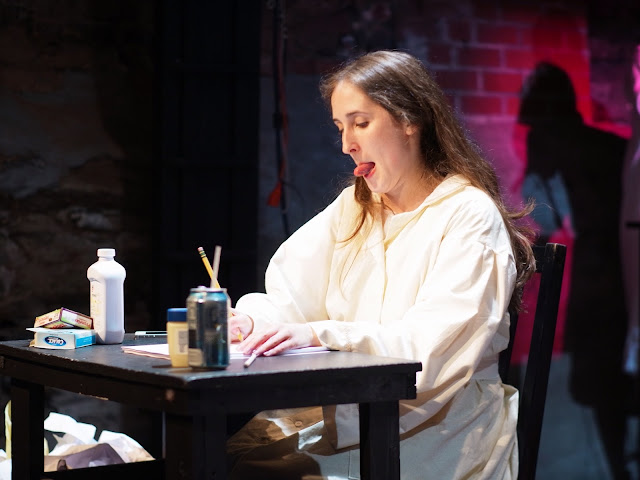Shut UP, Emily Dickinson
Directed by Sara Wolkowitz
466 Grand Street (at Pitt Street), Manhattan, NYC
July 28-August 13, 2022
.jpg) |
| Tanya O’Debra as Emily Dickinson and Gregg Bellón. Photo by Molly Broxton. |
Not so long ago, television's
Dickinson gave us Emily Dickinson the cool, rebellious, queer, feminist teen. Now, the stage at Abrons Arts Center gives us a new Emily Dickinson, and she is…mostly not those things; but neither is she the austere, reclusive genius of other imaginings. In Tanya O'Debra's wickedly funny
Shut UP, Emily Dickinson, the poet would be quite happy if everything could just be how she wants it when she wants it that way; and just because she is correct that she should not be forced to conform to others' ideas of things such as love does not mean that she cannot at the same time be exasperating to those others–to be the kind of person, say, who assumes that her wealthy family's laborers would find it a mark of regard and solidarity to be given the task of carrying her coffin when death stops for her.
The popular picture of Dickinson is of a sickly, sexless, death-obsessed hermit in white (like Elizabeth I, another never-married woman who wrote poetry, Dickinson's chaste image has inspired much speculation about her romantic life). Only a very few of the vast number of poems that she wrote, notable in part for their lack of rhyme, often irregular meter, and liberal use of dashes as punctuation, were published during her lifetime, and at first were subject to editing to make them more conventional. Now, 136 years after her death, Dickison represents a cottage academic and popular culture industry entirely on her own.
Shut UP, Emily Dickinson wonders early on what the poet would–and what we should–think about the fact that the life and work of someone who apparently hardly left her bedroom in the later part of her life, never published most of her work, and asked for her papers to be burned is now subject to endless scrutiny and interpretation by a limitless number of people.
 |
| Tanya O’Debra as Emily Dickinson. Photo by Molly Broxton. |
The play takes place in that bedroom, a white-on-white set, and features Dickinson, played by playwright O'Debra, and The Master (Gregg Bellón), to whom some of her poems are addressed, and who may or may not have been an actual, specific individual, just as here he may or may not be a portrait with whom Dickinson holds imaginary conversations. The dynamic between this white-clad pair savors of dominance and submission, except that Dickinson just can't bring herself to be submissive. Rather than the buzz of Dickinson's famous death-marking fly, there is the recurring buzz of a bee that may represent (the pain of, perhaps the prick of) desire. She is less interested in being sexy than in being an unapologetic weirdo who has a thing for teeth and who writes a poetic paean to Cheetos–no, Cheetos did not exist in nineteenth-century Amherst, but time, the play opines, is a mixtape, a structuring maxim for the play that also loops us back to that idea of endless reinterpretation.
 |
| Tanya O’Debra as Emily Dickinson. Photo by Molly Broxton. |
When The Master is not trying to get Dickinson to be sexy–or to go outside–he can be prone to pointed observations such as that her father's wealth supports an eccentric lifestyle which her maid, say, could never choose to assume. At the same time,
Shut UP gives legitimacy to Dickinson's experience of fear, for example, suggesting a link to depression and anxiety (once you have seen the play, think about if you would go through that bedroom door) as it does other aspects of the poet's lived experience. From ribaldry to fourth wall breaking (and repairing) to outright absurdity, the production is hilarious from beginning to end, and O'Debra and Bellón are superb, an unimpeachable comic duo.
The play raises the idea that poetry is a way both of revealing and walling off the self. It also features a vocally processed version of the Meow Mix song. What we're saying is that
Shut UP, Emily Dickinson is wholly, fearlessly its unique self–like, one might say, Emily Dickinson. But you can only see one of them live right now.
-John R. Ziegler and Leah Richards
.jpg)





Comments
Post a Comment